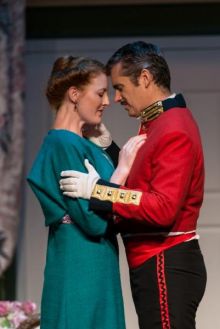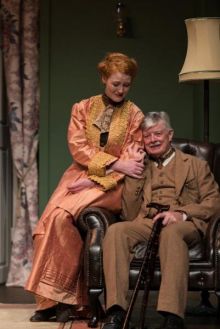The Winslow Boy
The Winslow Boy is based on an actual incident involving George Archer-Shee who was expelled from Osborne Naval College in 1908 for stealing a postal order from a fellow cadet, but who was eventually exonerated after a lengthy, and very political, struggle.
In Rattigan’s 1946 play, George Archer- Shee becomes Ronnie Winslow, a fourteen-year-old cadet accused of the theft of a five shilling postal order. An internal enquiry, conducted without informing his family, finds him guilty and his father is asked to withdraw him from the college.
The family believes Ronnie to be innocent and thus evolves a complicated and expensive effort to clear his name, an effort that begins with trying to sue the Admiralty and eventually employing a well-known barrister and opposition member of Parliament, Sir Robert Morton, who takes Ronnie’s case to the House of Commons, resulting in much publicity and embarrassment for the Admiralty.
 As well as telling Ronnie’s story, Rattigan has painted a vignette of life and issues in Edwardian England. Ronnie’s sister Kate is a suffragette; his brother Dickie is an Oxford student more interested in his social life than his study. Their father, Arthur, a retired banker, is concerned about justice and clearing the family name.
As well as telling Ronnie’s story, Rattigan has painted a vignette of life and issues in Edwardian England. Ronnie’s sister Kate is a suffragette; his brother Dickie is an Oxford student more interested in his social life than his study. Their father, Arthur, a retired banker, is concerned about justice and clearing the family name.
Nanette Frew’s production brings this picture of 1908 England authentically to the Genesian stage. The suggestion of the family’s middle class prosperity is there in Owen Gimblett’s set. Peter Henson’s costumes are, as always, true to the colours, styles and traditions of the period, with the ladies’ hats (Sandra Bass) adding a little extra ‘oomph’.
Frew has obviously worked with her cast to establish the close and open family that is evident in Rattigan’s script. That the characters and relationships have been carefully developed is evident in the tensions that build as the case against Ronnie gains more and more publicity.
 Sonia Kerr is strong as Catherine (Kate) Winslow. She has a commanding stage presence and establishes Kate as an intelligent woman of strong convictions who is also warm, compassionate and loyal. Kerr wears her Edwardian costumes with style and is totally at home in the character and the period, especially in her scenes with Sir Robert Morton, played by Roger Gimblett.
Sonia Kerr is strong as Catherine (Kate) Winslow. She has a commanding stage presence and establishes Kate as an intelligent woman of strong convictions who is also warm, compassionate and loyal. Kerr wears her Edwardian costumes with style and is totally at home in the character and the period, especially in her scenes with Sir Robert Morton, played by Roger Gimblett.
Like Kerr, Gimblett moves easily and gracefully on the stage, and establishes his character quickly and effectively. With his brisk and confident entrance, his no-nonsense interrogation of Ronnie, his clear and staccato summation of the situation and his eventual vestiges of compassion, Gimblett brings needed pace and vibrancy to the production.
 Thirteen-year-old Matthew Balkus plays Ronnie Winslow. He handles the various emotional situations Ronnie faces competently: anxiety as he faces his family; defiance as he professes his innocence; relief after he faces interrogation; and typical teenage disinterest as the case becomes less and less personal and more and more political.
Thirteen-year-old Matthew Balkus plays Ronnie Winslow. He handles the various emotional situations Ronnie faces competently: anxiety as he faces his family; defiance as he professes his innocence; relief after he faces interrogation; and typical teenage disinterest as the case becomes less and less personal and more and more political.
David Stewart-Hunter plays Arthur Winslow with controlled concern and, as the case drags on, shows his declining health subtly. Lois Marsh, as his wife, Grace, finds greater depth to her character in the second half of the production when the family and its future seem most threatened.
Tom Massey is amusing as the bumbling solicitor, Desmond Curry, whose unrequited love for Kate is touchingly portrayed. Her fiancé, John Watherstone (David Prickett), is far from touching as he stiffly ‘bails out’ of their engagement because of the adverse publicity.
Meg Mooney plays the indiscrete and not-so-well-trained family retainer Violet, and Jane Thorpe the pushy journalist, Miss Barnes.
The Winslow Boy is a classic that loses none of its impact or the inferences of its themes – especially when directed so competently and dressed so elegantly. It is a gentle addition to the busy schedule of theatre events in Sydney at the moment.
Carol Wimmer
Photographer: Mark Banks
Subscribe to our E-Newsletter, buy our latest print edition or find a Performing Arts book at Book Nook.

